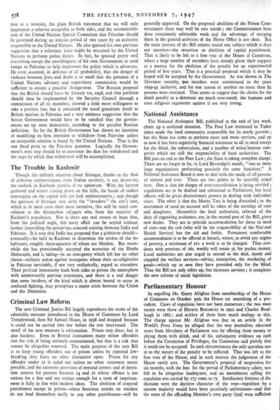National Assistance
The National Assistance Bill, published at the end of last week, clears up a confused situation. The Poor Law instituted in Tudor times made the local community responsible for its needy persons ; but the State has come to perform more and more services, and up to now it has been organising financial assistance to all in need except for the blind, the tuberculous, and a number of miscellaneous cate- gories which are still the responsibility of local authorities. The Bill puts an end to the Poor Law ; the State is taking complete charge. There are no longer to be, in Lord Beveridge's words, " two or more large organisations performing precisely the same functions." A National Assistance Board is now to deal with the needs of all persons of sixteen and over. There are two points to be specially noted here. One is that the danger of over-centralisation is being avoided ; regulations are to be drafted and submitted to Parliament, but local officers will be given discretionary powers in dealing with individual cases. The other is that the Means Test is being discarded ; in the assessment of need no account will be taken of the earnings of sons and daughters. Meanwhile the local authorities, relieved of the duty of organising assistance, are, in the.second part of the Bill, given new duties. They are to provide accommodation for those in need of care—not the sick (who will be the responsibility of the National Health Service) but the old and feeble. Permanent comfortable accommodation is to be offered at hostels, where, to avoid any stigma of poverty, a minimum of 21$. a week is to be charged. Thus resi- dents with pensions of 26s. weekly will retain 5s. for pocket money. Local authorities are also urged to extend to the deaf, dumb and crippled the welfare services—advice, instruction, the marketing of goods—which up to now they have provided only for the blind_ Thus the Bill not only tidies up, but increases services ; it completes the new scheme of social legislation.


































 Previous page
Previous page